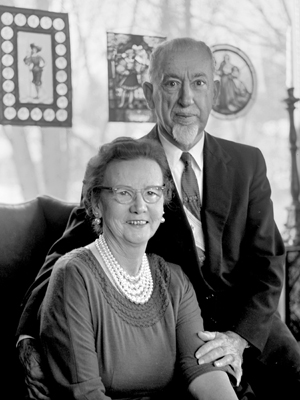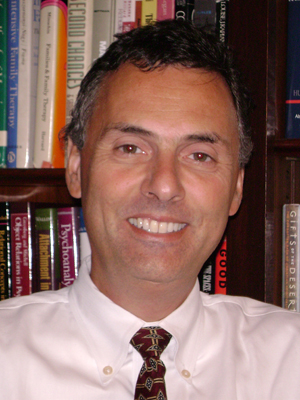BU’s Danielsen Institute Celebrates 60th Anniversary
Using psychotherapy, counseling, ministry to alleviate suffering

A child dangled from atop a water tower by bullies: this was but one trauma young Albert Danielsen endured while living in a Baltimore orphanage in the early 1900s. From age 11 to 16, he was routinely beaten up, shoved underwater while swimming, and deprived of sleep by a tormentor who would smuggle snakes or frogs into his bed. An early life of loneliness and poverty (one Christmas, his only gift was a clipped newspaper photo of Santa) primed Danielsen for an adult life helping others in need, after he’d acquired a fortune and found love with his wife, Jessie (SED’39).
The Danielsens funded BU’s Danielsen Pastoral Counseling Center—today, the Albert & Jessie Danielsen Institute—now celebrating the 60th anniversary of its mission to provide psychotherapy and psychological assessment, often informed by spirituality, to people with mental and spiritual health issues. Marking the anniversary is the institute’s 2012 Merle Jordan Conference, The Skillful Soul of the Psychotherapist: Master Clinicians and Theologians in Dialogue. The conference, taking place this Sunday and Monday, October 7 and 8, is free and open to the public (save for fees for a boxed lunch Monday and continuing education credits from the conference). Space is limited; find details and register here.
BU Today interviewed Danielsen executive director George Stavros about the institute’s services for BU students and staff, its research, and its melding of science and the spiritual.
BU Today: Could you spell out the mental health services you provide for BU students and staff, and how these differ from, or coordinate with, similar University programs?
Stavros: The Danielsen Institute provides psychotherapy, psychopharmacology, and psychological testing services to around 500 clients each year, with approximately 150 of those clients being students and staff from BU. Our role within the larger BU mental health safety net is to provide mental health care to students and staff who need ongoing services over a longer period of time, as opposed to crisis or short-term mental health interventions. We work collaboratively with Student Health Services, the Center for Psychiatric Rehabilitation, the Office of Disability Services, the Center for Anxiety & Related Disorders, and the Faculty & Staff Assistance Office.
What percentage of your clients come from BU and what percentage from elsewhere?
Because our clinic is a Department of Public Health licensed outpatient mental health facility, we see people from all over greater Boston, but we’ve always stayed fairly steady at around 30 percent of our clients coming from the University.

When the institute began, was the notion of linking spirituality and psychology novel, and how has our understanding of the link evolved over the past 60 years?
The connection between spirituality and psychology lived more on the fringes 60 years ago, with religion having come under a fairly withering, one-sided attack by psychology pioneers like Sigmund Freud and Albert Ellis. In some ways, it used to be a real risk to one’s credibility as a clinician to be connected to organized religion, or to be open about one’s own religious beliefs. In 1952, Albert and Jessie Danielsen teamed up with Professor Paul Johnson, a pastoral psychology professor in BU’s School of Theology, to put together a visionary model for clinical service, teaching, training, and research in psychology and religion. It was ahead of its time, and it was an island of sorts.
Things have really changed, particularly in the past 20 years or so. The main mental health disciplines, social work, psychology, and psychiatry, each in its own way, are taking religion and spirituality seriously. It is now an ethical mandate that clinicians be sensitive to the positive and even potential negative impacts of a client’s religious beliefs and practices. It’s also much more common to find mental health literature and research that affirm ways in which religion and spirituality have been oriented towards healing the human psyche for thousands of years. I think there is a greater appreciation in mental health for religion and spirituality as resources and conversation partners in clinical care and research. At the Danielsen, we feel like we’re operating and interacting in much more friendly waters than has ever been the case.
The Danielsen provides psychological screening for seminarians. Which denominations or groups avail themselves of those services and how big a segment of your work is it?
We’ve done seminarian screening, ordination screening, clergy-in-crisis assessments, and religious community consultations for the Episcopal Church, the Roman Catholic Church, the Black Ministerial Alliance, the Church of the Nazarene, the Greek Orthodox Church, the Presbyterian Church, the United Church of Christ, and the United Methodist Church. We’ve also worked with a number of individual congregations, theological schools, and religious orders in these ways. This kind of work is at the heart of what Albert and Jessie Danielsen originally wanted us to be doing, to be helping those who are in ministry to be psychologically healthy and prepared for the difficult work they are undertaking. One in four of our clients are persons connected to ministry. At the same time, it was also critically important to the Danielsens that we provide the finest clinical services to those who needed it, regardless of whether they were religiously affiliated. For many of our clients, treatment involves little or no mention of religion or spirituality. We follow the client’s lead on this.
What types of research is the institute pursuing through its Center for the Study of Religion and Psychology?
Up until now, the bulk of the institute’s research has been in two areas. The first has been in clergy wellness and resilience. We’ve been asked by a number of denominations to take a look at the impact that highly stressful ministerial environments have on the emotional and spiritual stability of clergy. We are now expanding that work to include the impact of ministry stress on clergy marriages. The second has been to study the effectiveness of religious interventions, such as meditation, in promoting mental health. The plan going forward at the research center is to focus much more on psychotherapy research, looking at ways in which a therapist’s attention to religious and spiritual issues affects the treatment process and treatment outcomes. We’re excited to be moving in this direction, and we’ll be naming a new research center director in the near future to coordinate and lead this research effort.
Can you tell us about the conference you’re holding to mark the institute’s anniversary and what you hope might come out of it?
The 2012 Merle Jordan Conference is a direct extension of how we train therapists in our psychotherapy training program, with what you’ll see on stage being very similar in structure to what we do each week at the Danielsen. We’ve invited three master clinician-scholars who are great speakers and absolutely at the top of the psychotherapy field, Nancy McWilliams, Salman Akhtar, and David Wallin, to join us and reflect on how their personal religious and spiritual beliefs impact their clinical work and writing. Each speaker, following their presentation, will join a small group of clinical and theological respondents, and we’ll let them talk to each other and see what happens. We’re just as excited about the spontaneous and creative interplay on stage as we are about the presentations themselves. Anyone can attend the conference for free, and there will be a live webcast as well.

Comments & Discussion
Boston University moderates comments to facilitate an informed, substantive, civil conversation. Abusive, profane, self-promotional, misleading, incoherent or off-topic comments will be rejected. Moderators are staffed during regular business hours (EST) and can only accept comments written in English. Statistics or facts must include a citation or a link to the citation.